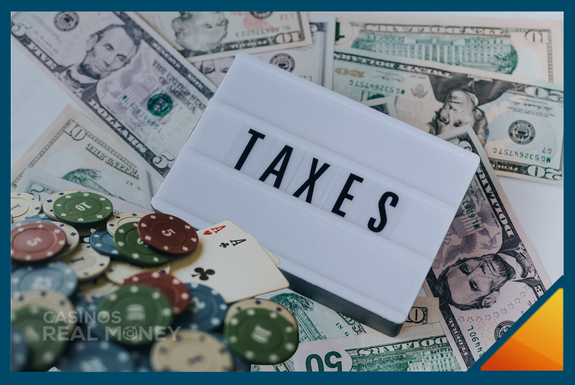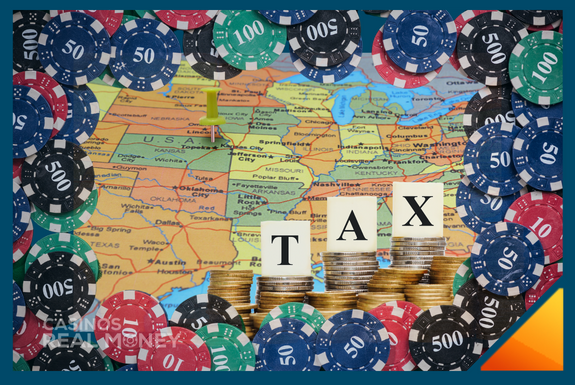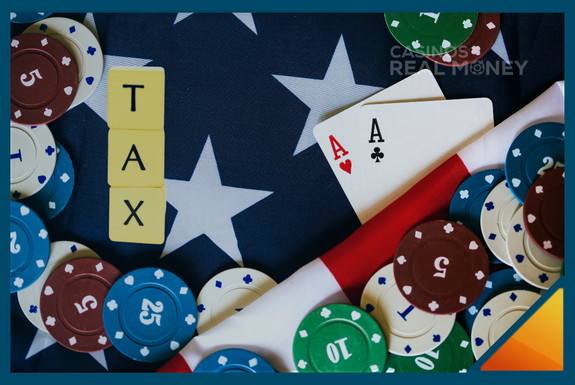How Are Casino Winnings Taxed in the US?

You may have to pay taxes on the money you win at a casino. However, few people care to find out whether they do. Winnings from gambling are subject to taxation by the Internal Revenue Service IRS. That said, you should calculate how much you will owe the government. This will, of course, depend on certain factors.
No need for worry, though, since we promise not to drown you in a sea of dull facts. The goal is to make this as engaging as possible while conveying all the necessary details. Ready?
- Different Types of Gambling Winnings
- How the Federal Government Taxes Casino Winnings
- What About Taxes at the State and Local Levels?
- Professional Gaming and Deducting Gambling Losses
- Are Non-U.S. Citizens Taxed the Same Way?
Different Types of Gambling Winnings
Firstly, let’s talk about the types of gaming revenue the IRS considers taxable. The tax man will want their cut of whatever windfall you get from gambling. Whether from a massive win at the races, a lucky casino wager, or a lucky lottery ticket. Also, this includes the worth of any awards other than cash, such as automobiles, jewelry, or trips.
It generally includes monetary compensation in addition to the item’s worth according to current market standards, where applicable. That may vary from one place to the next, but it’s generally standard across most gambling-friendly jurisdictions.
How the Federal Government Taxes Casino Winnings
Now comes the million-dollar question: how much will you owe in federal taxes?
To start, it will be determined by how much money you win and the games that the money was won playing.
The player should file a tax return to the IRS if they receive any of the following sums in winnings:

- A minimum of $600 at the racetrack (if that is 300 times your bet)
- $1,200 or more won from playing the slot machines or bingo game
- Keno payouts of $1,500 or more (minus the amount you bet)
- Wins from poker tournaments totaling $5,000 or more (minus the amount you bet or buy-in price)
Thankfully, because the casino handles withholding taxes and remitting the money straight to the IRS, you don’t need to be concerned about these aspects of the transaction.
For each of them, players need to provide their Social Security number to the payer and report the whole amount earned on IRS Form W2-G. Typically, the casino will withhold 25 percent of your earnings to cover these IRS gambling taxes before paying.
The IRS Form W2-G is not required for all prize money in the ranges above. For instance, blackjack, craps, baccarat, and roulette earnings of any size are exempt from the forms.
This does not absolve you of the responsibility of paying taxes or declaring the earnings on your tax return. The IRS must be informed of any profits from gaming. This implies that you may skip filling out W2-G if your primary source of income is table gaming.
What About Taxes at the State and Local Levels?
It is possible that, in addition to federal taxes, you’ll owe state taxes on your casino payout. Gambling earnings are not taxed in Pennsylvania, Ohio, or Indiana, among others. However, you could pay between 5% and 8% of your wins to the state government in New York and New Jersey. And, of course, each state has regulations for everything else.

That said, you must ensure you are within the bounds of the law before heading to the nearest casino or playing online.
Furthermore, if the taxes levied by the state weren’t enough, several cities and towns also impose taxes on gambling profits. Take, for example, casino winnings in the city of Detroit are subject to a surcharge of 2%.
Professional Gaming and Deducting Gambling Losses
Gaming winnings are taxed at the individual’s standard effective income tax rate if gambling is the taxpayer’s primary source of income. When filing taxes as a self-employed person, it is necessary to use Schedule C to report both revenue and expenditures. On the same note, gambling losses may be deducted by a professional gambler on Schedule C as an “occupational cost” (not Schedule A).
Professional gamblers may write off their losses as ordinary company expenditures, but there is a catch. You will need evidence that gambling is your full-time job and that you are making money from it. Maintaining a detailed record of your wins and losses is crucial, as is a history of consistent and sizeable profits. Making it a profession may not be the best option if you’re not prepared to get your hands dirty and be organized.
Are Non-U.S. Citizens Taxed the Same Way?
In the case of non-U.S. citizens or permanent residents, the taxation of gambling earnings may be particularly complex. All “fixed or determinable yearly or periodic gains, earnings, and income” (including gambling wins) earned in the United States must be reported and taxed by nonresident aliens.

The situation becomes more complicated when you consider that gambling losses are not tax deductible since they are not directly related to the operation of a trade or corporation inside the United States. In other words, nonresident aliens must pay taxes on their earnings but cannot deduct losses from those winnings. It’s the equivalent of playing blackjack and being required to pay taxes on your wins while being unable to deduct losses from those gains.
Not fair, right? In an interesting twist, the Internal Revenue Service and domestic gamblers have historically had similar conflicts. It took a few court cases for everything to shape up to what it is now.
Summary
High-stakes gaming may influence your tax liability whether you are a citizen, permanent resident, or nonresident of the United States. Significant gains might put you in a higher tax band and result in a greater rate than anticipated. It is, therefore, crucial to know and understand the laws.
You should consult a tax specialist to handle your finances if you have significant winnings or losses from gambling. Sometimes, attempting to beat the odds on a weekend night in Vegas is less complicated than comprehending the tax regulations governing gambling profits.




